The 5th Filipino American International Book Festival opened at the San Francisco Main Library the second weekend in October (12-13, 2019). Hosted by the Philippine American Writers and Artists (PAWA), the San Francisco Public Library, and the Filipino American Center (SFPL), the book festival celebrated the theme, “Isang Mundo: Humanity, Diversity, and Resistance in the Arts.”

After the opening remarks on Saturday, the festival commenced with the session, “If You Want to Know What We Are,” which is taken from a poem by Carlos Bulosan. Professor at San Francisco City College Lily Ann Villaraza moderated the panel comprising Bay Area-based Randy Ribay, whose novel The Patron Saints of Nothing was longlisted for the National Book Award for YA; Yves Lamson, Toronto-based author of the novel Bodies of Water; poet Ivy Alvarez of New Zealand; Hawaii-based R. Zamora Linmark, author of The Importance of Being Wilde at Heart; poet Mookie Katigbak-Lacuesta, and her husband, Angelo R. Lacuesta, short story writer and editor from the Philippines. The topic was made interesting by the fact that each writer’s perceived and experienced identity was shaped by where they grew up. Lamson, Alvarez, and Ribay, who grew up near Detroit, Mich., did not have a large Filipino community to identify with. And Linmark’s Hawaii had its own ethnic subgroups. Filipinos in Hawaii had a much different experience, given the multiplicity of ethnic groups there, than those who were more isolated.
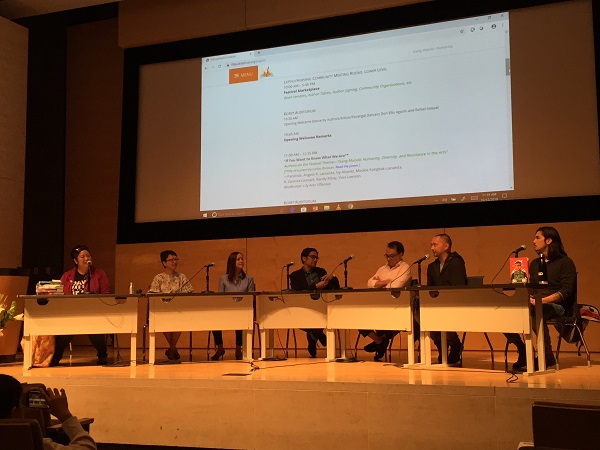



During the Q&A, one elderly Filipina woman asked the panelists what tribe they belonged to, as if that distinguished and validated their identity. Lacuesta noted that his lineage traces back to a particular tribe in the Philippines. At this point, Villaraza pointed out that many of her Filipino American students struggle with identity (half-Filipino, not really Filipino because, for example, they don’t know the language, etc.), and that her duty, so to speak, is to allow them to accept themselves as fully Filpino without apology. It was an interesting discussion and allowed for deep introspection of what it means to be Filipino, for that meaning is different for everyone, especially shaped by when and where they lived their formative lives.
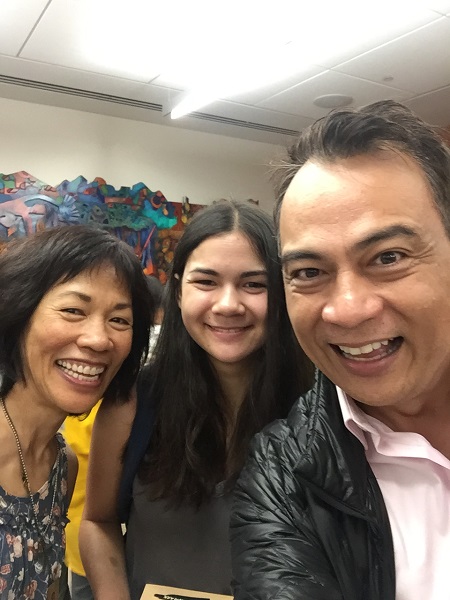
The festival features a recurring session called Hot Off the Press, which highlights authors whose books have been published in the last two years. This year 19 authors gave short readings from their work, including Grace Talusan, whose debut memoir, The Body Papers, the Restless Books Prize for New Immigrant Writing, has garnered critical acclaim.

My daughter, Isabella, and I enjoyed the Filipinx Diasporic Poetry session, which featured Mookie Katigbak-Lacuesta, Ivy Alvarez, Christina Querrer, Elmer Omar Bascos Pizo, Jason Bayani, Jan-Henry Gray, and Eugene Gloria. I was so taken by Mookie Katigbak-Lacuesta’s early work, Hush Harbor: Poems, that after the reading I asked if there somehow was a way to get a copy of the book of poems, which was published by the University of Santo Tomas Publishing House but now out of print. In fact, she had read from a copy of the book. She graciously offered me the copy she read from, apologizing for it being copy from a printer. But I was so astonished by her generosity. I’m looking forward to reading the book of poems, especially since she was inspired to write a poem from Carlos Bulosan’s experience in the taxi dance halls of America. (In return, I gave her a copy of my book.)

On Sunday, Jose Antonio Vargas gave a stirring Opening Remarks, touching on the status of undocumented Filipinos in this country and his own experiences of “lying, passing, and hiding” in America and its impact on his life. What’s most poignant in hearing Vargas speak is his missing his mother and how being separated from her has left a yawning dark gap that cannot be filled. Following his keynote address, Napa Valley College Professor Janet Mendoza Stickmon moderated the panel, Dear America: Writing Filipinx Counter Narratives, which included Talusan; Vargas; Juanita Tamayo Lott, whose memoir, Golden Children: Legacy of Ethnic Studies, SF State, was published by Eastwind Books of Berkeley; Janice Sapigao, poet; E.J.R. David, Associate Professor of Psychology at the University of Alaska and author of We Have Not Stopped Trembling Yet: Letters to My Filipino-Athabascan Family; and poet Jan-Henry Gray, author of Documents.
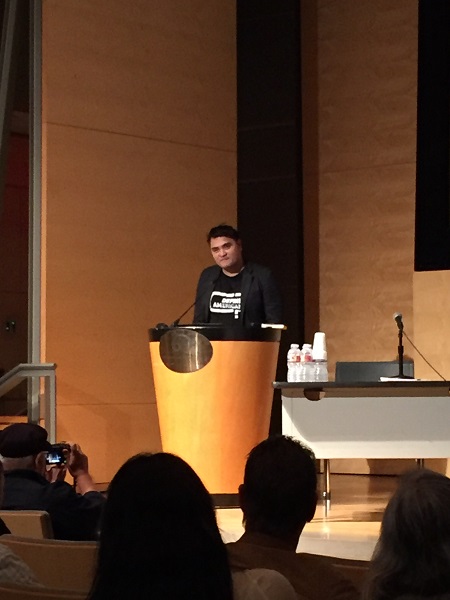
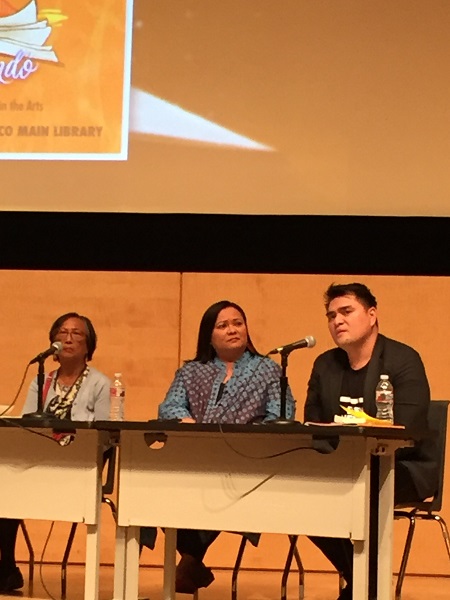
Tamayo Lott emphasized the importance of being counted, how statistics matters for minorities and immigrants, and how we need to learn from those who blazed a trail for us in the fight for Ethnic Studies. E.J.R. David pointed out that he tells his children that they are 100% Filipino and 100% Athabascan (his wife is Athabascan) and that the math works out in the end. To call Filipinos whose parents have other ethnic identities “half” or “quarter” denies them of their full heritage, which made sense to me and made me rethink how I describe my own children – half-Filipino. Talusan, Vargas, and Gray, who all experienced the state of being undocumented – although Vargas remains undocumented, discussed how their undocumented status defines them and how they overcome that label. Undocumented status has really become a major topic in our Filipino American community, and Vargas pointed out that the numbers that are routinely noted by the U.S. Government (Homeland Security) – 300,000 – is surely conservative and that the numbers are much higher. But we don’t talk about it.
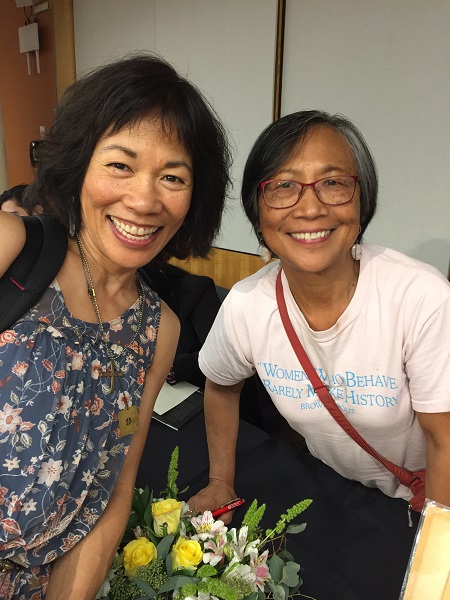
We missed a few sessions on both Saturday and Sunday that I would have liked to have seen. On Saturday evening, The Philippine Center hosted a screening of the documentary, The Al Robles Express. “Five artists travel to the Philippines in honor of San Francisco Manilatown poet Al Robles to explore the tribal lands that lived in Al’s literary imagination. What this film is about is one’s eternal search to find themselves and to find home. Because, until you find home, you won’t find yourself. Above that, it’s about artists’ and poets’ expression; defining what art is and how non-artists can relate and apply it to their lives.” Chet Canlas was producer, director, and cameraman. I hope that the documentary is screened locally again sometime in the near future.
And the last session I missed was the closing session, “(We Are) Bulosan’s Children: Growing Up in the Aura and Shadow of America is in the Heart, Growing Filipinx Narrative in the 21st Century. The panelists included Elaine Castillo, author of America Is Not the Heart; Ricco Siasoco, Eugene Gloria, Malaka Gharib, Christina Querrer, and Jason Bayani. I hope to catch a recording of this.

There were other sessions, as well, that I would have liked to have attended, including the Young Adults Authors and one on Filipino cuisine, which is a seeing a Renaissance of its own in the world of fine restaurants in this country. When you look a the list of authors who participated in the 5th Filipino American Internation l Book Festival, you have to be impressed by the breadth and depth of their works and contribution to the Filipino American literary canon. We are growing and the future is bright, which is all very exciting. Isang Mundo, indeed.